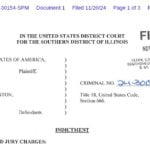DuPage Co. (ECWd) –
Note to COD Board Members: “You have a fiduciary duty to protect students and taxpayers from corruption and law breaking.”
Why are COD Foundation Board Members receiving no-bid contracts, or contracts that circumvent a competitive bidding process? Data at OpenTheBooks.com show $192 million paid from the COD college checkbook into COD Foundation Board members and their affiliates companies over the past few years.
Here’s the story of just one of them, Roger C. Marquardt & Company, owned by COD Foundation Board Member Scott Marquardt—in part a lobbyist firm.
In previous pieces, I’ve exposed COD President Robert Breuder’s half-truths and word games in this article: (Click here for Half Truths and Deception article) . A main point of that exposure was to highlight Breuder’s liberty with what the law outlines in regards to no-bid requirements. I’m not a lawyer, but he did not cite the law even remotely close to what it states, which could certainly have the effect of misleading the board of trustees.
For background: Hurricane Graphics also received a contract without a formal bid process and over a half million COD checkbook dollars have flowed to this company—also a COD Foundation Board member. When comparing the Board Approval Document (BAD) for Herricane Graphics against the most recent no-bid BAD for the COD lobbyist contract, Roger Marquardt (another Foundation Board member owned company) something stands out!
Herricane Graphics no bid justification: “This purchase complies with State Statue, Board Policy and Administrative Procedures. The purchase of professional services are exempt from bidding under Illinois Public Community College Act, 110 ILCS 805/3-27.1″
Roger C. Marquardt & Company, Inc no bid justification: “This purchase complies with State Statute, Board Policy and Administrative Procedures. In accordance with 110 ILCS 805/3-27.1 Public Community College Act, contracts for the services of individuals possessing a high degree of professional skill where ability or fitness of the individual plays an important part are exempt from competitive bidding.”
How interesting that the language in one fails to disclose the actual true statutory language while another nails it word for word? You would think if they were confident in the no-bid guidelines they would apply it equally for all their foundation board members. I wonder what changed that they quoted it right on the December 18th BAD for Marquardt’s lobbyist contract?
Also note that the Lobbying contract that was awarded to the Foundation Board Member Scott Marquardt actually was based on a Proposal submitted, as this contract was not based on bids that they would lead you to believe in the language!
What makes this so interesting is the above statutory language outlines their justification for NOT putting it out for bid yet they claim 35 companies received an invitation to “bid”. They even claim “to ensure due diligence in identification of potential bidders“, thirty-three (33) firms with lobbyists registered in Illinois with interest in education were also identified and directly solicited.”
It all sounds great doesn’t it?
Due diligence! Invitation to bid! Thirty Five companies contacted!
I call Hogwash!
One big problem! This was not a public bid for any kind of services! This was a request for proposals of which they received ONE! Yes, ONE proposal even though there are 1700 lobbyists in the state of Illinois. Only one out of the claimed 35 that received invitations to “bid” provided a proposal and yes, it was from the business of a COD Foundation Board member.
Well folks, there is a reason for that! The reason is in the language as the lobbyist knew what was happening here. This was not a “bid” as they would lead the trustees and the public to believe because by law all bids must be open in a public setting with the Board or their approved agents. In this case we know with the text found in the guidelines for submitting a proposal this was not going to be a transparent transaction. “..selection will be kept strictly confidential”.
Most lobbyist know the difference between a bid and an RFP. Had it been an honest opportunity to “bid” on the business I suspect many more firms would have participated but when it’s a no public bid opening RFP process they pretty well know that’s language for the connected firm who is going to get the contract. In this case, that would be the COD Foundation Board member!
This had no public bid opening, and in fact the very Request for Proposals stated in bold print, “There will be no public bid opening.” (Click here for copy of the RFP Document – see page 5)
The language presented to the board, even though it contained the exact wording of the law this time, still misleads the board because it insinuates that you don’t have to bid, all while claiming in the text above that section they claim they took an effort to show due diligence to identify bidders and in that process they identified 33 firms.
When you read their BAD the distinct impression is that this matter was put out for bid, when in reality that is the furthest thing from the truth! This appears to be yet another contract awarded to the only firm that submitted a proposal. How convenient that the board and the public was lead to believe this was actually put out for bid!
To the Trustees of COD, Wake the hell up!








2 Comments
Kirk Allen
Posted at 21:54h, 08 JanuarySamantha, I know the difference quite well and I said this was an RFP.
“This was not a public bid for any kind of services! This was a request for proposals of which they received ONE! ”
Did you miss that?
I could agree the term “bidders” could have been used instead of vendors however such an error would reflect someone is not paying much attention to what they are doing.
Using your suggestion the “error” happen 7 times in the RFP. Who drafts an RFP that states: “The undersigned makes the foregoing Bid subject to all of the terms and conditions of the Contract Documents”
OR this one –
“The undersigned warrants that all of the facts and information submitted by the
undersigned in connection with this “Bid” are true and correct.”
I think the question you asked of me should be asked of who ever drafted the RFP that states on the very top of the page in the upper right corner – “BIDDER___________”
The placement of the term bid was not an error as placing the term “vendor” in these documents makes no sense.
My experience in public procurement spans over 30 years. It does not take a rocket scientist to read the procurement laws and apply them.
With such clear and basic examples I have to ask, did you even read the RFP? Did you read the Board Approval Documents?
Samantha
Posted at 15:50h, 08 JanuaryPlease look up the difference between an RFP and an IFB. This was appropriately an RFP. Maybe the term “bidders” was used instead of vendors in error, but RFPs generally aren’t open publicly, vendors are solicited as stated here in your documents, but it is not a IFB and not publicly opened. What are your qualifications in the public procurement sector?